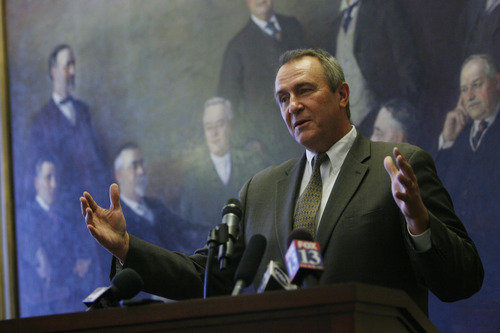This is an archived article that was published on sltrib.com in 2012, and information in the article may be outdated. It is provided only for personal research purposes and may not be reprinted.
Utah Attorney General Mark Shurtleff said Tuesday that removingthe July trigger date of the state's guest-worker law would be "a step backward" even as momentum appears to be building towards just that.
Shurtleff made the comments during a Utah Public Radio morning program hosted by Tom Williams. He said to delay putting HB116 into effect would remove pressure on the federal government to tackle comprehensive immigration reform.
"We should establish the whole program," Shurtleff said. "This action based on The Utah Compact was an example for the rest of the nation."
But Sen. Stuart Reid, R-Ogden, who was Senate sponsor of HB116, said he believed the federal government would sue the state if HB116 were allowed to take effect on July 1
"I think we should probably move the date back at a minimum," Reid said. "Those discussions are going on right now and we'll just see. I'm pretty convinced if we don't push it back, we will be sued."
Sen. Curt Bramble, R-Provo, and Sen. Steve Urquhart, R-St. George, have already had discussions to that effect as well.
Bramble told The Salt Lake Tribune last week that establishing the program would"cost the state a lot of money to set up." According to the fiscal note on HB116, start-up costs for fiscal year 2013 could exceeed $6 million.
He also said employers could be subject to lawsuits by the federal government for knowingly hiring illegal immigrants.
The law, which was signed by Gov. Gary Herbert in 2011, would establish a guest worker permit for immigrants who had been in the state prior to May 2010. Those who qualified after passing background checks would pay either a $1,000 or $2,500 fine and then be allowed to work.
It was dubbed "The Utah Compact Law" based on that document signed two years ago by political, religious and business leaders in the state prior to the legislative session where HB116 passed 41-32 in the House and 19-5 in the Senate. The Utah Compact was a set of guiding principles aimed at taking a compassionate view on illegal immigration and spurred copycats in several other states.
The law received immediate pushback from Utah Republicans who believed it would turn the state into a sanctuary for illegal immigrants and some successfully pushed through resolutions at county and state party conventions to get it repealed.
However, that was before the 2012 presidential election, where Republicans saw the first Mormon presidential nominee and state favorite Mitt Romney lose the Latino vote by epic proportions. According to Latino Decisions, a polling firm that tracks voting patterns of Hispanics, Romney lost almost three-fourths of that voting bloc — a key to him losing several swing states, including Nevada and Colorado.
Some Republicans nationally, including Sen. Marco Rubio, R-Fla., Louisiana Gov. Bobby Jindal and even conservative talk show host Sean Hannity, are talking about changing their approach to the immigration issue. President Barack Obama has also signaled a desire to tackle immigration reform as a top priority.
Reid said by holding back on starting HB116, it would give the state time to look at what the federal government plans to do.
But Arturo Morales-Llan, an outspoken critic of the law, said that normalizing status for illegal immigrants would take away jobs from unemployed legal residents in Utah while rewarding those who may have used a stolen Social Security number to get a job before getting the guest-worker permit.
"Are we willing to give a free pass to those who have stolen IDs from innocent victims whose lives have been completely ruined?" he said. "Who cannot buy a house? Who cannot buy a car? Who cannot get a student loan because someone used their Social Security number?"
When the Legislature convenes in January, many of the lawmakers who carried the four immigration bills in 2011 that became a part of Utah's comprehensive approach will be absent.
Rep. Bill Wright, the Republican House sponsor of HB116, lost his seat this year. John Dougall, the Republican who sponsored the so-called "adopt an immigrant" HB469 bill, left his seat and was elected to state auditor. And Stephen Sandstrom, the Orem Republican who sponsored HB497, Utah's enforcement-only law, left his seat in an unsuccessful congressional bid.
But Sandstrom, who was a hard-liner in 2011 and angrily joined activists to seek the repeal of HB116, has had what he described as "an about-face" on illegal immigration — including full support of the Dream Act, which he previously vehemently opposed.
He now also supports HB116 — with some tweaks — and agreed with Shurtleff that Utah shouldn't backpedal and risk diffusing pressure on the federal government to establish comprehensive reform.
"Let's go for it and push the envelope," Sandstrom said. "I think pulling the trigger and implementing it is the way to go."
Twitter: @davemontero



